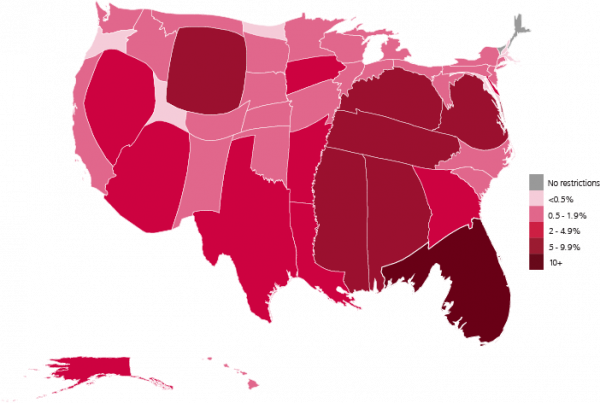
Amy Bach, a lawyer and criminal justice journalist, built a free public tool titled “Measures for Justice” that contains data on over 300 county court systems in 6 states. The nonprofit has received funding from the burgeoning activism of the tech community — Google gave Measures for Justice a grant for $1.5 million dollars and the Chan Zuckerberg Initiative recently announced they would be awarding the nonprofit $6.5 million. Due to the fragmented nature of the criminal justice system, the Measures for Justice research team frequently had to travel to individual counties in order to request records.
Sociologists who study punishment have long recognized the importance of geography in structuring disadvantage, at multiple levels. For instance, there are tremendous differences between states in the scope and impact of felon voting restrictions. Florida, for instance, contains 27% of all disenfranchised felons in the United States—in large part due to its policy of disenfranchising people after they have completed their sentences.. On the other end of the spectrum, Vermont and Maine allow even prisoners to vote. Another way that geography structures punishment is through children’s experiences of parental incarceration, which varies substantially by region. Moreover, the extent of racial disparity also varies regionally, with African American children experiencing the highest risks in all regions, and Latinos experiencing the most disadvantage in the West and Northeast.
- Christopher Muller and Christopher Wildeman. 2016. “Geographic Variation in the Cumulative Risk of Imprisonment and Parental Imprisonment in the United States.” Demography 53(5): 1499-1509.
- Chris Uggen, Ryan Larson, and Sarah Shannon. 2016. “6 Million Lost Voters: State-level Estimates of Felony Disenfranchisement.” The Sentencing Project.
In a similar vein, even new forms of cybercrime are structured by geography. Sociologists have recently started to explore how these new types of crimes, such as cyber-victimization, are shaped by state-level characteristics.
- Hyojong Song, Michael Lynch, and John Cochran. 2016. “A Macro-Social Exploratory Analysis of the Rate of Interstate Cyber-Victimization.” American Journal of Criminal Justice 41(3): 583-601.
These efforts could prove useful for scholars and for the public. For example, Measures for Justice developed a “Fair Process” indicator, which is closely tied to the social science concept of procedural justice — the idea that citizens will be more likely to comply with the law and requests of law enforcement if they perceive the system as fair. Recently, reforms and police training based on procedural justice have begun to be widely implemented.
- Daniel Nagin and Cody Telep. 2017. “Procedural Justice and Legal Compliance.” Annual Review of Law and Social Science.
- John Hagan and Valerie Hans. 2017. “Procedural Justice Theory and Public Policy: An Exchange.” Annual Review of Law and Social Science.
Veronica Horowitz is a Ph.D Candidate in sociology at the University of Minnesota who studies punishment, mercy, and gender in the U.S. criminal justice system.

Comments